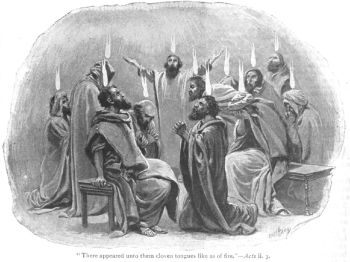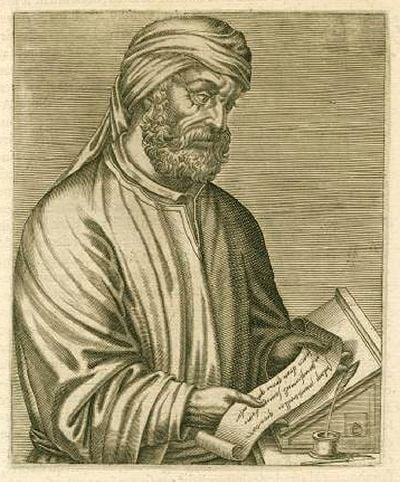Montanism
Montanism was an early Christian sectarian movement beginning in the mid-2nd century CE, named after its founder Montanus. It's defining characteristic was a belief in continuing revelation and a refusal to compromise with worldly standards. Montanists believed that their founder, together with the two prophetesses Priscilla and Maximilla, were in special and direct communion with the Holy Spirit. It flourished in and around the region of Phrygia, and also spread to other regions in the Roman Empire before Christianity was generally tolerated or legal. Strongly devoted to spiritual purity and refusing any compromise with the secular authority, the Montanists counted many martyrs among their adherents. No less an intellectual power than the otherwise fiercely orthodox Tertullian of Carthage supported their cause and beliefs.
Although the bishops eventually declared Montanism to be a heresy, the sect persisted well into the fourth century and continued in some places for another three or four hundred years.
The condemnation of Montanism by the orthodox Church put a virtual end to the tradition of Christian prophecy and ecsatic worship.
Thereafter, recognized Christian prophets would be few and far between. Because of its practice of esctatic communion with the Spirit and its claim of continuing revelation through its prophets, some people have drawn parallels between Montanism and Pentecostalism.
Doctrine and Practice
Although Motanist writings were reportedly numerous, no works of the early Montanists survive. Tertullian's later writings contain defenses of their doctrines and practices, but his major work in support of Montanus, "De Ecstasia," is lost, probably destroyed by church authorities as essentially heretical. We are thus dependant for the most part on critics of the movement, usually writing more than a century after the fact, for information. Citations from the church historians Eusebius and Epiphanius are the most important of these.
An essential teaching of the "new prophecy," as it was called, was that the Paraclete, or Holy Spirit, had come to purify the church in preparation for the imminent coming of Christ in fulfillment of Jesus' prophecy in John 14:26:
- The Comforter [also translated Counselor, Helper, Intercessor], the Holy Spirit, Whom the Father will send in My name, He will teach you all things. And He will cause you to recall everything I have told you.
Montanist leaders channeled revelations from the Holy Spirit urging moral rigor, especially chastity, fasting, and willingness to face martyrdom rather than flee or pay bribes. Remarraige was strictly forbidden, and there is some indication serious sins — such as murder, honoring Roman deities, adultery, and refusing to confess one's Christianity — were considered unforgivable once a believer had been baptized.
With regard to martyrdom, Montanus is quoted as saying, "Do not desire to depart this life in bed, in miscarriages, in soft ssfevers, but in martydoms, that He who suffered for you may be glorified."
And regarding chastity and revelations, Priscilla says: "The chaste minister knows how to minister holiness. For those who purify their hears both see visions... and hear manifest voices."
The Montanists were also accused of going too far when, for example, Montanus declared: "I am the Father, the Word, and the Paraclete," and Maximilla proclaimed: "Hear not me, but hear Christ." It is questionable, however, whether Montanus and his companions claimed such titles for themselves or simply believed that they were channels through whom the Spirt spoke. The Old Testament prophets after all, punctuated their prophecies by saying: "I am the Lord" (Is. 42:8, Ezek. 20:7, Hos 12:9) and, "I the Lord have spoken." (Ezek. 5:17,19) Epiphanius quotes Montanus as describing God's work in him this way: "Behold, the man is like a lyre, and I dart like the plectrum. The man sleeps, and I am awake." ("Haer.", 67:4)
Finally, the idea that women could act as ministers of Christ had already been rejected by the bishops. Added to this, Priscilla reportedly claimed a night vision in which Christ slelpt by her side "in the form of woman, clad in bright garment." This vision revealed that Pepuza, the Montanist headquarters, would be the place that "Jerusalem above comes down."
To summarize: the actions beliefs of Montanists were suspect by othodox standards because they impugned the ultimate teaching authority of the bishops, undermined the principle of the universality of the Church by insisting on too strict a standard of spiritual purity for believers, allowed their women prophetesses an authority greater than that of priests and bishops, and opened the door to heresy through unchecked declarations of their ecstatic revelations.
History
Although the extent to which Montanist teaching was heretical may be debatable, that they quickly constituted challenge to epsicopal authority is clear. Shortly after Montanus' conversion to Christianity, he began travelling among the rural settlements of Asia Minor, preaching and testifying. Dates are uncertain, but it appears that the beginning of Monatanus' career was 155-165 C.E. Accompanied by Prisca (also called Priscilla) and Maximilla, he offered a charismatic ministry featuring ecstatic spiritual manifestations.
Montanus claimed to have received a series of direct revelations from the Spirit. As they went, "the Three," as they were called, spoke in ecstatic trance-like states and urged their followers to fast and pray, so that they might share these personal revelations. His preachings spread from his native Phrygia across the contemporary Christian world, to Africa and Gaul. In Catharage they attracted the allegiance of Tertullian, who became the leader of a Montanist faction in that city that persisted until it was reconciled with the Church through the ministry of St. Augustine. Montanists were generally recognized for their holiness and refused to compromise with Roman authorities on questions of honoring Roman state deities. As a result, they counted many martyrs among their numbers. Recent studies suggest that numerous Christian martrys, including the famous saints Perpetua and Felicitas, who died in Carthage in the early second century, may have been Montanists or at least influenced by Montanism.
Inscriptions from the region of Phryigia indicate that whole towns had become Montanist. The orthodox hierarchy thus fought to suppress it. Bishop Apollinarius found the church at Ancyra torn in two, and he opposed the "false prophesy" (quoted by Eusebius 5.16.5). Bishop St.Irenaeus of Lyon, who visited Rome during the height of the controversy, in the pontificate of Eleuterus, returned to find Lyon in dissension, and was inspired to write the first great statement of the mainstream Catholic position, Adversus Haereses. Euleuterus, for his part, seems to have approved of the Montanists at first but was later dissuaded from this view.
Tertullian claimed that only false accusations had moved the pope to condemn the movement:
- "For after the Bishop of Rome had acknowledged the prophetic gifts of Montanus, Prisca, and Maximilla, and, in consequence of the acknowledgment, had bestowed his peace on the churches of Asia and Phrygia, he (Praxeas), by importunately urging false accusations against the prophets themselves and their churches... compelled him to recall the pacific letter which he had issued, as well as to desist from his purpose of acknowledging the said gifts. By this Praxeas did a twofold service for the devil at Rome: he drove away prophecy, and he brought in heresy; he put to flight the Paraclete, and he crucified the Father." ("Adversus Praxeam," I)
A native of Cathage, Tertullian was by far the best known defender of Montanists. He seems to have become a Montanist around the turn of third century, about 20 years or so after his conversion to Christianity. A respected intellectual champion of orthodoxy in every other respect, Tertulllian decried the spiritual laxity and corruption that he believed had infected the Catholic Church in his day. He believed that the new prophecy was genuinely motivated and saw it as a remedy to the Church's ills. His later writings grew increasingly caustic in decrying the moral corruption of what he now called "the church of a lot of bishops." (On Modesty) On questions of doctrine, however, he claimed that: "In this alone we differ, in that we do not receive the scond marriage (as Catholics allowed) and we do not refuse the prophecy of Montanus concerning the future judgment."
Local councils in Asia Minor reportedly moved against the Montanists as early as 177. When one such synod excommunicated Maximilla, she exclaimed "I am driven away like the wolf from the sheep. I am no wolf: I am word and spirit and power." Nevertheless the new prophecy retained significant pockets of influence in the region, as well as in North Africa and even Rome. Inscriptions in the Tembris valley of northern Phrygia, dated between 249 and 279, openly proclaim allegiance of towns to Montanism. Constantine the Great and other Emperors later passed laws against the sect, and by the time of Justinian I, such legislation was stictly enforced. Still, small communities of Montanists reportedly persisted into the eighth century in some regions.
External links
- Catholic Encyclopedia: Montanists
- Jerome's letter (xli) to Marcella to refute the heresy of Montanus, written in 385, "the passages brought together from the Gospel of John" having occasioned Marcella's questions
- EarlyChurch.org.uk Extensive bibliography and on-line articles.
Sources
- Eusebius of Caesarea, Historia ecclesiae, 5.16–18
Further reading
- Butler, Rex D., The New Prophecy & "New Visions": Evidence of Montanism in the Passion of Perpetua and Felicitas, Catholic University of America Press, 2006. ISBN: 0813214556
- Groh, Dennis E. 1985. "Utterance and exegesis: Biblical interpretation in the Montanist crisis," in Groh and Jewett, The Living Text (New York) pp 73 – 95.
- Heine, R.E., 1987 "The Role of the Gospel of John in the Montanist controversy," in Second Century v. 6, pp 1 – 18.
- Heine, R.E., 1989. "The Gospel of John and the Montanist debate at Rome," in Studia Patristica 21, pp 95 – 100.
- Pagels, Elaine, 2003. Beyond Belief: The Secret Gospel of Thomas ISBN 0375501568, contains a brief introduction to Montanism, with notes in chapter "God's Word or Human Words?"
- Trevett, Christine, 1996. Montanism: Gender, Authority and the New Prophecy. Cambridge University Press, 2002. ISBN: 0521528704
Credits
New World Encyclopedia writers and editors rewrote and completed the Wikipedia article in accordance with New World Encyclopedia standards. This article abides by terms of the Creative Commons CC-by-sa 3.0 License (CC-by-sa), which may be used and disseminated with proper attribution. Credit is due under the terms of this license that can reference both the New World Encyclopedia contributors and the selfless volunteer contributors of the Wikimedia Foundation. To cite this article click here for a list of acceptable citing formats.The history of earlier contributions by wikipedians is accessible to researchers here:
The history of this article since it was imported to New World Encyclopedia:
Note: Some restrictions may apply to use of individual images which are separately licensed.

